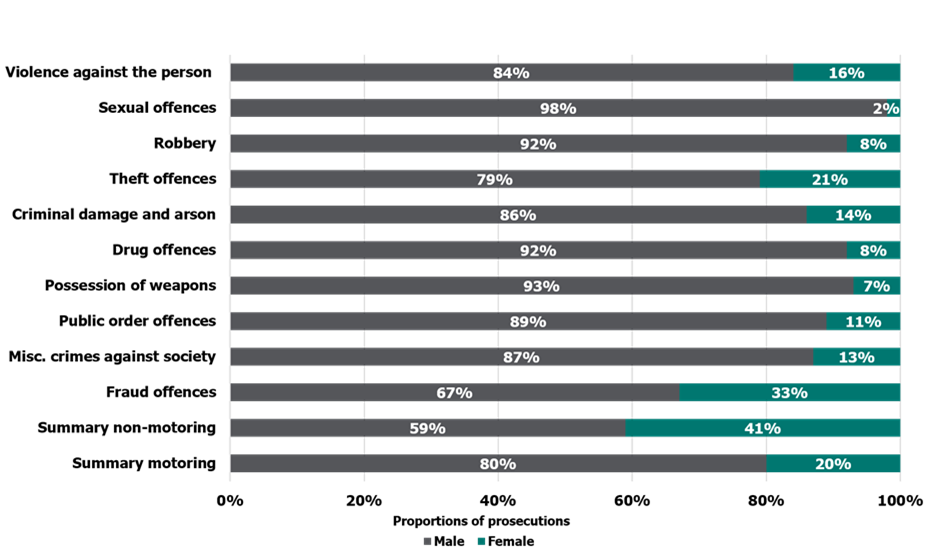There are many misunderstandings circulating about the criminal justice system and the prisoners which inhabit it. For example, as a young child you may have learnt that prison makes society safer: somewhat true, but also very much not. As part of the HMP Downview partnership, which focuses on educating ourselves and others about women in the criminal justice system, we are here to help bust some of common myths about prisons.
Myth: Women in prison are all innately dangerous individuals
Whilst it is absolutely true that there are dangerous, violent women in prison, this is not always the case. Less than 30% of women in prison have committed violent crimes which is far less than the male prison population. As shown in the chart below, women represent 41% of less serious crime convictions (such as TV licence evasion) yet only 16% of ‘violent crimes.

Furthermore, many women who commit crimes are themselves victims of circumstance. For instance, around 67% of women in prison have been victims of domestic violence and over 50% of the women in prison have survived either emotional, physical, or sexual abuse as a child. Therefore, characterising women (or, indeed, any prisoner) as innately dangerous is highly reductive – not taking into account the immensely challenging life experiences which undoubtedly contributed to their criminality.
Myth: Prisons always make society safer
Of course, prisons are essential for removing some of the most dangerous members from society. However, there are only a few people who have committed these highly dangerous, class A crimes. Instead, the majority (over 60%) of those incarcerated have committed a non-violent offence, with nearly 2 in 5 having been sentenced to serve less than six months in prison. Hence, we are sending people to prison who do not necessarily represent a threat to the public.
Furthermore, 42% of adult prisoners are reconvicted of another offence within one year of release. This suggests that prisons are not an effective method to make society safer as prisoners get caught in a cycle of reoffending.
The negative consequences of imprisonment also extend to the families of prisoners. For instance, it is estimated that 2/3 (63%) of prisoners’ sons will go on to offend themselves. This trend is unsurprising given how these children (totalling an estimated 100,000) have their lives uprooted by the sudden separation from their parents. Many such children end up in foster care which, in itself, considerably raises their likelihood of offending. Consequently, sending parents to prisons paradoxically leads to a less stable society as it sparks generational cycles of offending.
Therefore, many prison reformists have argued for alternative punishments (such as community orders) – particularly for parents and those who have committed less serious crimes.
Myth: Sentences are too lenient
A common refrain you may hear from people is that the criminal justice system is becoming too ‘soft’ on crime: the sentences too lenient, the treatment too kind, the prisons too nice. However, this is simply not the case. If anything, the justice system has become more harsh as judges are generally imposing longer minimum terms than in the past. For instance, the average minimum term for murder rose from 13 years in 2000 to 21 years in 2021. Additionally, those serving mandatory life sentences for murder are being forced to carry out more of their sentence in prison – spending an average of 5 more years in custody than in 2001. Moreover, whilst some prisons do have specific measures to improve the lives of prisoners (such as HMP Downview’s library), conditions remain abysmal. Particularly during COVID, official prison inspections reported that some prisoners were locked up for more than 23 hours a day and violence is rife (32,800 recorded assaults in prisons in England and Wales in 2019). Evidently, the justice system is anything but ‘lenient’.
Furthermore, the idea of a softer justice system is not necessarily a bad thing! In fact, many prison reformists argue that the more humane treatment of prisoners would be effective to prevent reoffending. To illustrate, the Scandinavian justice system is often cited as an ideal situation in which kinder prison systems lead to a decrease in reoffending rate. For example, Norwegian prisoners receive shorter sentences, careers advice, and have regular counselling sessions to tackle underlying issues such as addiction. As a result, the reoffending rate in Norway 2 years post release is only 20% whilst in the UK it’s 60%.
Myth: Everyone in prison has been convicted of a crime
When someone is accused of a crime, there is inevitably a gap between the first hearing and the actual trial – often years due to the court backlog. During this time, judges/magistrates choose whether to send the accused back home on bail or to remand them to custody (i.e. jail) until their trial in the interests of public safety. This means that a significant portion of the prison population have not actually been charged with any crime and so are, for all intents and purposes, innocent. In 2022, 40,424 of these people were sent to prison before their trial. Shockingly, 5% of people detained on remand are held for over 2 years before their trial commences – robbed of 2 years of their life for a crime they potentially did not even commit. Furthermore, 10% of adults and 35% of children remanded into custody by the magistrates’ courts in 2022 were subsequently acquitted. To put it bluntly, the backlogs in our justice system are putting innocent people in prison.
Remand is also a controversial issue as there is no hard-and-fast rule for who gets remanded on custody vs bail. This means that judges, marred by inherent human fallibility, are susceptible to making biased decisions. To illustrate, men of mixed race are 22% more likely to be remanded to custody at the Crown Court than white men; black men, 26% more. Thus, issues surrounding remand remain a blight on our justice system as innocent people are deprived of their freedoms in jail – undermining the very doctrine of ‘innocent until proven guilty’.
Myth: Prison officers are terrible people and ineffectual employees
People working in prisons, if not forgotten, are often antagonised in the media as greedy, ineffectual or even tyrannical! Largely hidden from view, officers perform one of the most critical and challenging jobs one can do. Prisons are severely understaffed and underfunded and so staff shortages in prisons are ever-increasing. For instance, the number of frontline operational prison staff was cut by 26% between 2010–2017. Therefore, claims of ineffectual prison officers may instead be a result of a chronically understaffed service. Furthermore, the working conditions are shocking. For example, in 2022, assaults on staff totalled a staggering 7229. Testament to this, more than 25% of staff leave after less than a year. How can people expect a system to be effective, if the staff within don’t stay long enough to gain experience?
Myth: Prison is the only option to deal with criminals
There are a variety of non-custodial sentences a court could impose upon someone who has been convicted of a crime. These alternatives to prison include mandatory participation in rehabilitation sessions (such as alcohol addiction recovery) and/or a ‘community service order’(i.e. unpaid community work).
There are many advantages to this course of action as the offender, whilst still being punished, is not separated from their family and friends. This reduces the collateral impact of imprisonment. Also, this (https://assets.publishing.service.gov.uk/media/5d1c732ee5274a08cdbe45c4/impact-short-custodial-sentences.pdf) fascinating research has concluded that community service orders are actually more effective than prisons in reducing reoffending rates as, among other things, criminals aren’t isolated from the outside world and can maintain their connections.
Conclusion
Hopefully you have learnt something about the often-obscured truths of the criminal justice system. If you want to learn more, this site (prison_the_facts_2023.pdf (prisonreformtrust.org.uk) is a good place to start. Also, feel free to come chat to any members of the Downview partnership!
